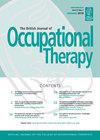Post-stroke depression, activities of daily living, and occupational therapy intervention: An observational survey
IF 1.3
4区 医学
Q3 REHABILITATION
引用次数: 0
Abstract
Introduction:Post-stroke depression is a frequent but under-diagnosed condition. Nevertheless, it impacts participation in activities of daily living (ADLs) and the rehabilitation process. The aim of this study is to analyze the influence of post-stroke depression on participation in ADLs and on occupational therapy (OT) intervention in adults.Methods:An observational study was conducted through a survey. The questionnaire covered OTs view about the influence of post-stroke depression on ADLs and occupational therapy treatment. Data collected by online questionnaire were analyzed through STATA中风后抑郁、日常生活活动和职业治疗干预:观察调查
导言:脑卒中后抑郁症是一种常见病,但诊断不足。然而,它对日常生活活动(ADLs)的参与和康复过程都有影响。本研究旨在分析中风后抑郁症对成人参与日常生活和职业治疗干预的影响。调查问卷涵盖了职业治疗师对卒中后抑郁对ADL和职业治疗的影响的看法。通过 STATA® 对在线问卷收集的数据进行了混合分析。定量数据通过描述性统计进行分析。结果:63 份调查问卷有效。脑卒中成人表现为对未来绝望、哭泣和紧张("经常"/"总是">50%)。与情绪稳定的患者(55.56%)相比,他们的职业表现往往更差,尤其是在自理活动方面(35.92%)。限制他们表现的因素包括意志力低下(41%)、运动能力下降(30%)和认知能力下降(19%)。对这些患者进行定向行走干预的目的是提高意志力(21.30%)、恢复角色(16.61%)和改善自理活动(14.08%)。这项研究强调了自愿因素在促进职业参与中的重要性,并为定向行走治疗提供了指导。看来有必要通过具体研究进行进一步调查。
本文章由计算机程序翻译,如有差异,请以英文原文为准。
求助全文
约1分钟内获得全文
求助全文
来源期刊

British Journal of Occupational Therapy
REHABILITATION-
CiteScore
2.20
自引率
15.40%
发文量
81
审稿时长
6-12 weeks
期刊介绍:
British Journal of Occupational Therapy (BJOT) is the official journal of the Royal College of Occupational Therapists. Its purpose is to publish articles with international relevance that advance knowledge in research, practice, education, and management in occupational therapy. It is a monthly peer reviewed publication that disseminates evidence on the effectiveness, benefit, and value of occupational therapy so that occupational therapists, service users, and key stakeholders can make informed decisions. BJOT publishes research articles, reviews, practice analyses, opinion pieces, editorials, letters to the editor and book reviews. It also regularly publishes special issues on topics relevant to occupational therapy.
 求助内容:
求助内容: 应助结果提醒方式:
应助结果提醒方式:


